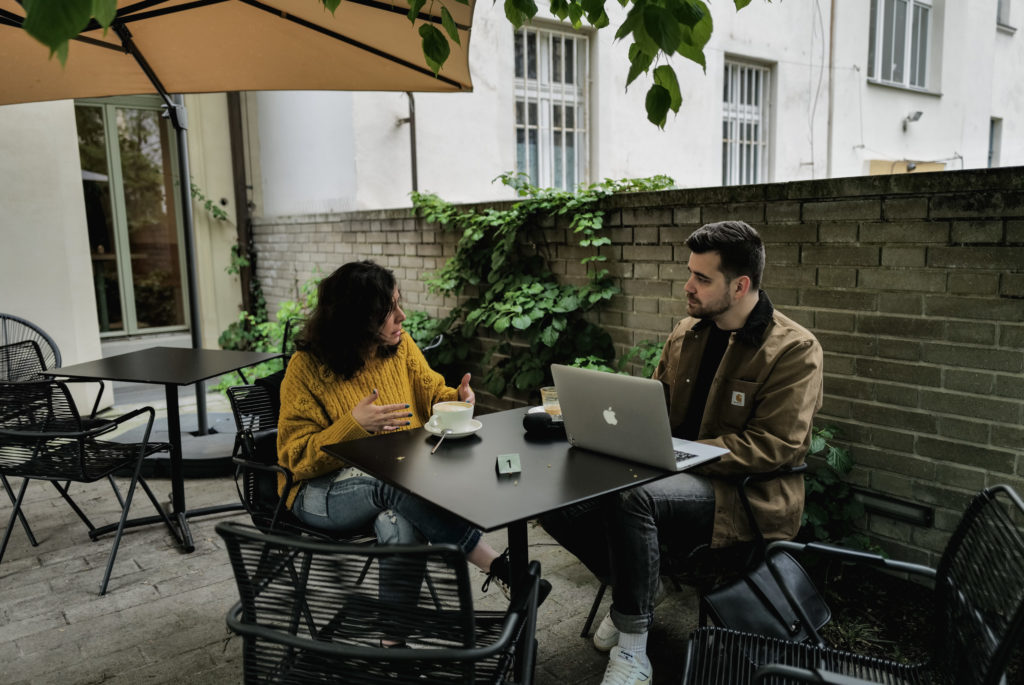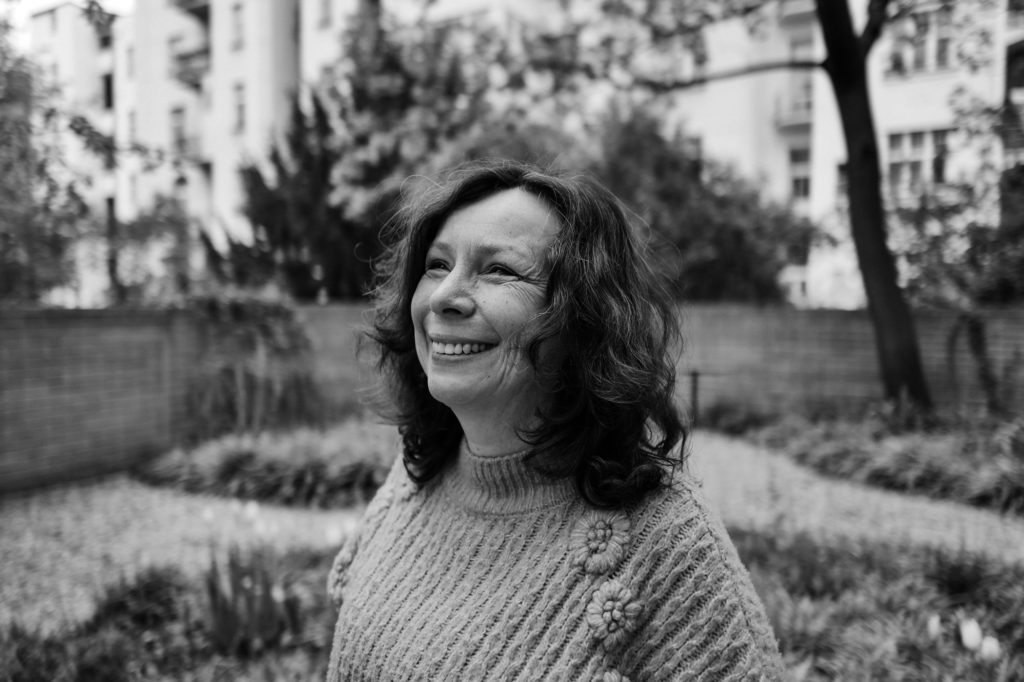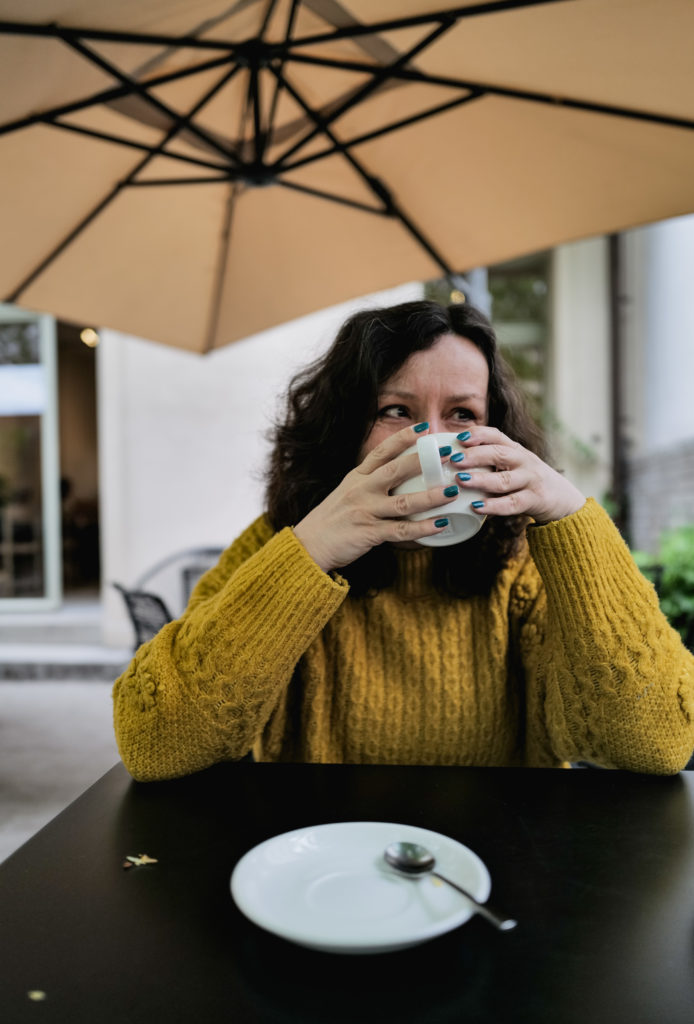The decision to make a series on such a serious topic does not come out of nowhere. Did the current situation in Ukraine hit you right away last February, when the invasion started?
Yes. Shortly after that, I met with Jan Herget, who now heads the documentary department at Czech Radio. We agreed that we should monitor the situation immediately. However, at that time, I was busy with work and couldn’t start filming right away. The media started publishing reports from the affected areas and writing about volunteers and refugees in our country. It seemed to me that I had missed the right moment and others had already documented the topic. When I was still making documentaries internally at the radio, I had a bit of a problem with us reacting late. Whether it was floods or other unexpected events, we often found ourselves one step behind.
Do you recall the first impulse that led you, despite everything, to document the subject?
I am simply a documentarian at heart, driven by the need to capture interesting things around me. And specifically in this case, it was about compassion too. The scenario of someone building their entire life, both emotionally and materially, and suddenly having to leave it all behind and go into exile is incredibly powerful to me. I enjoy travelling and I have no problem packing up and leaving occasionally. In fact, I might even be capable of living elsewhere. But being forced to leave due to war is something truly terrible.
Looking back, what do you consider to be the main message of the radio docuseries Our Ukrainians?
I started recording with one main objective – to find out how Ukrainians integrate in the Moravian town of Olešnice, which I read about in one article. The place is roughly 15 kilometers from Letovice, where we have a cottage. About 30 Ukrainians came here and were provided with accommodation by the then mayor Zdeněk Peša. They were able to adapt to their new home and the Ukrainian and Czech children found a common language. I realized that this might be the right path. I contacted the mayor, who was very kind and invited me to come and record the series.

Did the negative comments from Czech people in the media surprise you?
Yes, there were even some directly under the article about Olešnice. I came across lies and concentrated hatred there. I felt the need to show what the lives of these refugees really look like. I’m not sure if I fully succeeded in that. Specifically, the Czech residents of Olešnice are still just as willing to help as they were at the beginning, and they do not feel any hatred at all. The Ukrainians have found new friends and jobs here.
Listen to all three episodes of the documentary series Our Ukrainians.
How did you approach such a complicated topic?
I have been pondering about that for a long time. I was also afraid of the language barrier since I didn’t want to film in Russian. Although I graduated from the Russian language, I managed to completely forget it. However, when it comes to a radio documentary, Czech is simply the most suitable language. In the end, waiting for a while served me well – many Ukrainians learned to speak Czech. The mayor was also present the entire time. He kind of moderated the whole process and helped with translation when necessary. I recorded specific episodes in September, December, and finally in March. Over the course of six months, the Ukrainians made tremendous progress and significantly improved their Czech. We didn’t even need Russian at the end.
Did you meet any Ukrainians who personally encountered hatred in Olešnice?
I would like to mention a midwife who hasn’t yet completed the necessary attestation in the Czech Republic, so she has to work as a cleaner at a hospital. Unfortunately, according to what she said, other cleaners treated her somewhat hatefully. However, the situation improved within six months.

While you were recording, you must have met a lot of interesting people. Who stuck in your mind?
I was mainly impressed by the local children. They are so wonderfully spontaneous. Moreover, they seem to handle the whole situation better than most adults. They don’t fully understand what’s happening yet, and living here almost feels like a trip to them. And when it comes to the powerful stories, they mainly concerned specific adult women. In the first episode, Alesia described how she fled from Ukraine while pregnant, which really touched me. When she recounted what her journey here looked like, she already had a little boy in her arms who was born here, in Olešnice.
Fascination with sound
Jitka Škápíková has been involved with audio media throughout her entire career. She spent over 15 years working at Czech Radio and has dedicated over a decade to directing audiobooks. Now, she is also trying voice acting. However, she has never been a stranger to visual media either. As a dramaturg, she participates in the legendary series Kalendárium. “I enjoy auditory things, I perceive a lot through hearing. But it’s hard to say – maybe if I had first started on television years ago, everything would have turned out differently,” says Jitka Škápíková.
If you compare the first and the last episode, do you feel like the emotions of the respondents have changed in any way?
When I asked some of them in the third episode if everyone was okay at home and if they still had a place to return to, it seemed to me that they were starting to close in on themselves and didn’t want to talk much. At the beginning, they felt the need to describe what they were going through and how they got to the Czech Republic. But after six months, the style of their storytelling changed a lot, and it made me sad. I had the feeling that everything was hurting them more and more. Hopefully, I was wrong.
Did it seem to you that they wanted to return to Ukraine?
Most of them want to come back. The children are studying online to stay in touch with their homeland and keep practicing their native tongue. Once they return, they will have completed all their exams. But I also met a woman whose older son obtained a work permit and has already settled here, in the Czech Republic. That is also why she wants to stay here, together with her younger son and grandmother. Unfortunately, there is no one waiting for them in Ukraine. I was also impressed by Mrs. Světlana, who fled war with her three school-age children. She got a job as a teacher at a school in Olešnice and now helps Ukrainian children with their Czech language skills. Thanks to the fact that she has three children, she was able to bring her husband legally with her as well. In the second episode of the series, she describes how she travelled to Kyiv during Christmas to collect her belongings. Her family also wants to return to Ukraine one day. Ukrainian war refugees are united by gratitude. The children in Olešnice were also very grateful, explicitly thanking all Czechs in the series.

Would you be tempted to go to Ukraine and record some footage there as well?
I would love to. If I were 30 years younger and had no commitments, I would have been there already. I always felt like if I didn’t have a job that keeps me here, in the Czech Republic, I would go somewhere else to work as a volunteer.
Do you feel that the relationship between Czechs and Ukrainians is changing for the better or for the worse?
It depends on whether people have a brain in their head and a heart in their chest. I think that those who don’t will not even be interested in series like Our Ukrainians. But such projects always have a meaning, even if you don’t convince everyone. Even if your efforts only touch a few people, or they help to open someone’s eyes, they make sense.
Jitka Škápíková
She studied acting at JAMU and worked as a soloist at the former State Theater in Brno for four years. After graduating from Radio and Television Dramaturgy and Screenwriting, she joined Czech Radio in Prague in 1996. Here, she worked as a dramaturg and editor of documentary and literary-dramatic programs. In addition to radio, she has been actively involved in directing audiobooks for the publishing house OneHotBook and has contributed to the creation of the television series “Kalendárium.” From September 2022, she was recording the documentary series Our Ukrainians. In the three episodes, she portrayed the stories of Ukrainian refugees in the Moravian city of Olešnice. “My three visits to Olešnice were enough for the purposes of the documentary. But I feel that I would like to get closer to some of the people there. I would be interested in watching how their stories continue to unfold, both personally and professionally,” adds Jitka Škápíková.
